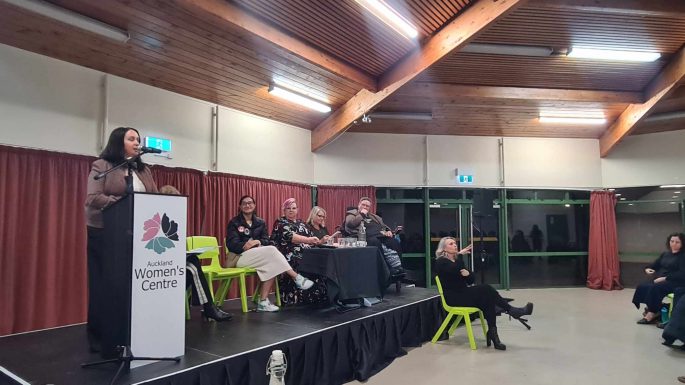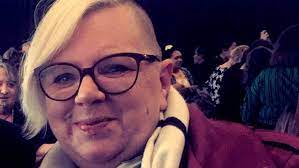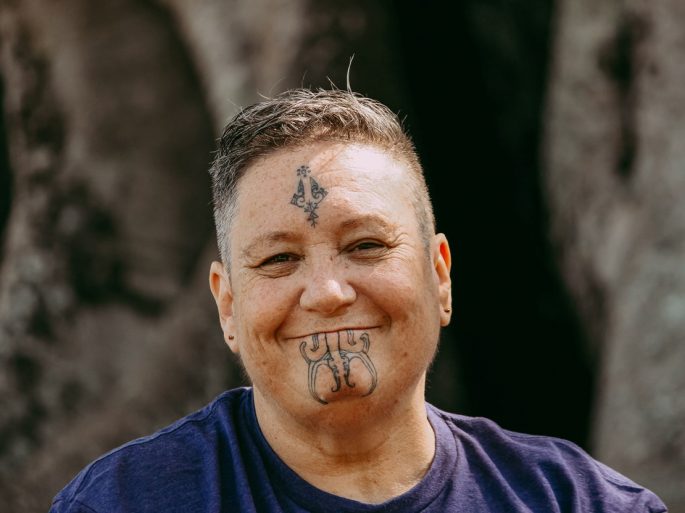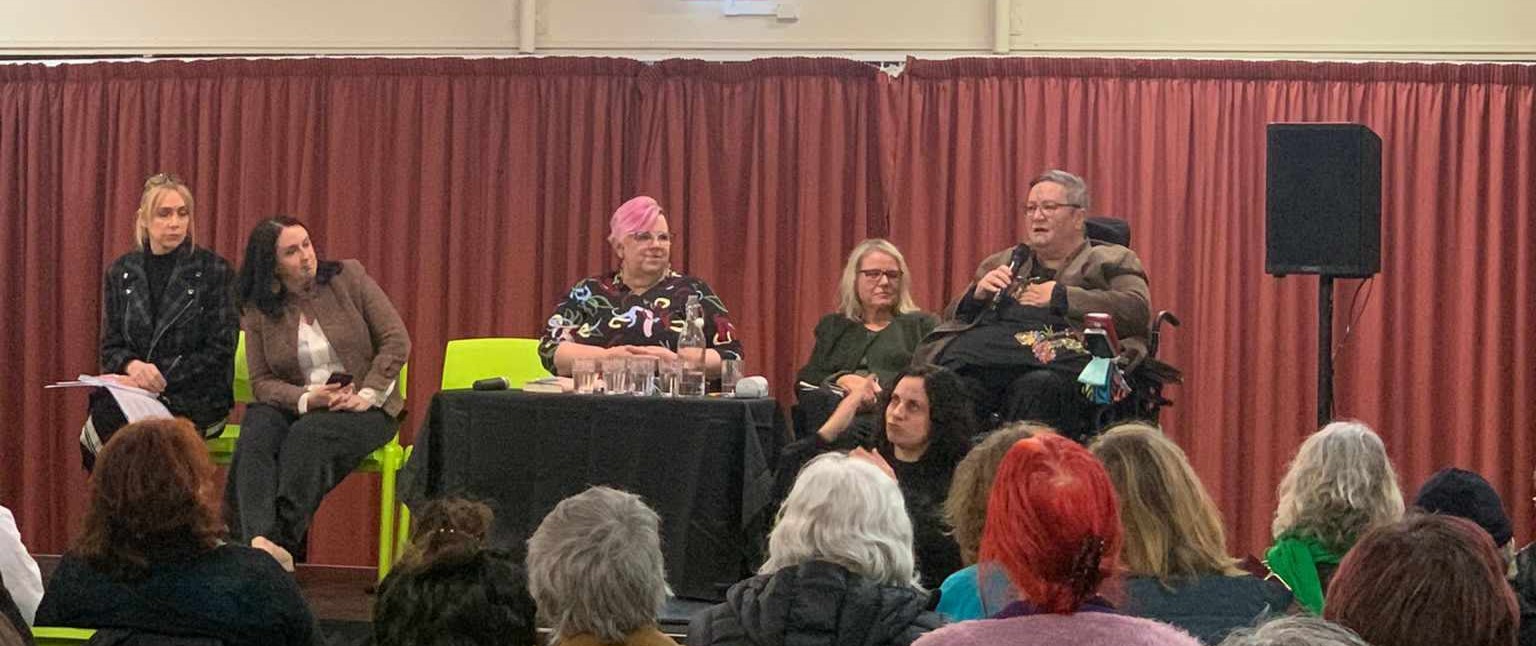How to survive Election 2023
Post-Covid fatigue, cost-of-living crisis, climate disasters, unchecked misogyny, the recent parliamentary grounds occupation – as chair and journalist Alison Mau put it, the upcoming election has the “most complex set of circumstances in my 30 years in this country.”
Last Wednesday 26 July, Auckland Women’s Centre hosted a community forum to unpack what the election priorities might be for women. Our panellists did a good job of making sense of it all.
First to speak, about what wāhine Māori need from the next government, was Zoe Aroha Witika-Hawke (Ngāti Hako, Ngāti Paoa). Zoe is chief executive of E Tipu E Rea Whānau Services which supports rangatahi who have pēpi or who are hapū. Underlining how systemic judgement affects multiple generations and a wide swathe of Māori communities, Zoe talked of her own mother, who the State considered to be unfit to parent when she became pregnant at 15, because she had been in State care herself. Such judgements continue.
“So we fight Oranga Tamariki to actually give our young mums a chance,” Zoe said. “The discrimination, the judgement and the racism is still strong. And our young whanau, they hide away because of it […] They continue to hide in shame because of what society is telling them about who they are. [That] it’s their fault, therefore they can’t get the Young Parent Payment, [instead] they have to beg for it because they don’t deserve it.”
The list of items they are allowed to buy with MSD-distributed payment cards is restricted. “It is a punitive system that is telling our young mamas that what they have done is wrong. And yet we are supposed to care about our future generations, our tamariki and our young people. I am asking everyone here to be aware of these issues, to know they still exist.
“We hope we’re not here in 3 years’ time, asking for the same thing. If you have an opportunity, stand up for our young people.

“We hope we’re not here in 3 years’ time, asking for the same thing. If you have an opportunity, stand up for our young people.” – Zoe Aroha Witika-Hawke
The second speaker, Agnes Magele, Auckland Action Against Poverty (AAAP) chairperson of Samoan heritage, had positive things to say about her Ōtara community to counteract media stereotypes. “We are a community based on love… If people are struggling, whatever little we have, we give.”
But she also noted that “Our reality isn’t bright, to be honest. This system has made it impossible for Pasifika women and mothers to reach our goals. Poverty is a huge driver of the challenges that we face.” For example, “They go on and on about ‘five plus a day’. We can’t even afford to get vegetables and fruit. They cost an arm and a leg.” Housing insecurity and relationship breakdowns were also often caused by poverty. “A lot of families in South Auckland are broken, but they’re broken because of the system we live in. They don’t become broken for nothing.”

“Do I stay within this violent relationship where I at least know how to manage it, or do I go out into the system where I don’t know how to manage it?” – Merran Lawler
Merran Lawler – the Kaiarahi & National Advocate for Te Kupenga Whakaoti Mahi Patunga / the National Network of Family Violence Services – pointed out that over the last few years there have been 27 reports from committees and inquiries about how to eliminate family violence and sexual violence and “they chronicle the same thing 27 times”.
Instead of more new ideas and frameworks, Merran said the next government needs to bring in concrete changes and practical interventions. “We need a government that is brave [and] prepared to acknowledge the system […] is a system of abuse. That women – when they step out of their home and the violence of the relationship – they are stepping into a system that can be as abusive – certainly as traumatising and retraumatising – as the abuse they face at home. And they’re made to make a choice – not a real choice: do I stay within this violent relationship where I at least know how to manage it, or do I go out into the system where I don’t know how to manage it?
“And frankly, any system that requires you to have a navigator is way too complex a system to be working with people. […] The impacts of violence go on and on and therefore the support needs to go on for as long as and wherever it is needed.”
Professor Jennifer Curtin, who researches politics and sport with a gender lens, pointed out that on both sides of the house “we see a very narrow conception of infrastructure” – politicians need to start acknowledging that social infrastructure has just as much impact on the economy (not to mention wellbeing). In addition “very few policy issues, if any, are gender neutral”. Which means natural disasters, climate change, public transport and research & development “all need a gender lens thank you very much!”
From the start, disability advocate Huhana Hickey pulled no punches: “I’m terrified,” she said of the election. “As a disabled woman, we are really struggling.”
She is concerned a National-Act government would take away Whaikaha “our new ministry”, benefits and housing rates”, and she noted disabled women experience violence and unemployment at particularly high rates. Using suffrage celebrations as an example, she pointed out disabled women most often are simply not included in any narrative. Nor are Covid deaths counted by disability status – Huhana herself nearly died last year from Covid and is still at risk. “Our health policy is not benefiting disabled people […[ People in Aotearoa don’t care about us anymore. […]I have watched people die [of avoidable death] because they were at risk.” She’s also concerned the new euthanasia laws do not come with enough safeguards to protect disabled people. And “when they do think about us they get it wrong because they don’t consult with us.”
Ali invited Lorri Mackness, AAAP and disability advocate, up from the floor to talk about the lack of support for a wealth tax from the major parties, which Ali described as a “gut punch” and “absolutely shocking”. Lorri agreed: “I do not understand how people get away with it in this country. […] I know people who are not eating tonight. It’s not good enough.” There is to be a “tax the rich” rally in the city on 19 August.
What wāhine Māori and all women need the next government to do
Voters! Have your favourite parties pledged the following?
- Offer care, not judgement: The next government needs to replace the current abusive system for women leaving violent relationships, and the current punitive system for rangatahi parents and their children, with easy-to-access relevant support.
- Lead risk management for victim-survivors of violence: The next government needs to take more responsibility for violence protection, rather than requiring victim-survivors to have their own resources and leaving them to try and access safety mechanisms on their own. For example, in Australia, police can request and advocate for protection orders on behalf of victim-survivors.
- Prioritise disabled women: The next government needs to stop hiding disabled people and stop ignoring them. Instead it needs to put consultation with disabled people at the centre of all policy development (rather than replacing them with parents and providers in consultations), to ensure disabled people can finally access their full human rights.
- Unlock families from poverty: The next government needs to raise benefit levels to liveable incomes.
- Ensure paid work is worthwhile: The next government needs to raise the minimum wage to the living wage; increase the level and reach of childcare subsidies for all preschool ages; honour and support pay equity claims between sectors, and mandate pay transparency, to reduce the gender pay gap for individuals.
- Protect current rights: The next government needs to acknowledge that women’s rights (such as participating in civil society without being subject to abuse) are deteriorating, and therefore (among other things) they need to retain the Ministry for Women and the gender lens on policy and budgeting (including for climate crisis responses); as well as maintaining NZ Super eligibility at age 65.
During question time, the benefits and limits of pay transparency legislation, and a universal basic income, were discussed, as was the vision of a demilitarised NZ, the role of businesses in violence prevention, and the need for Te Tiriti and ethnicity lenses – and a disability lens – to be used in policy analysis as well as decolonising the gender lens. Zoe agreed with the other panellists that all the topics discussed were connected. For example, lack of housing stops people leaving violent relationships. Shockingly, it can be harder if rangatahi are pregnant. “Housing providers often say ‘no! you’re hapu, we don’t take young mums’,” explained Zoe. She said the young mums feel like “the Green Party are coming through”.
And the young māmā have a “thirst for real big changes”. Amen to that.

“As a disabled woman, we are really struggling.” – Huhana Hickey

If you weren’t able to make it on the night, watch the full video
